英美戏剧莎士比亚戏剧节选
威尼斯商人(节选)

威尼斯商人(节选)简介《威尼斯商人》是莎士比亚创作的一部戏剧作品,被誉为是他最伟大的喜剧之一。
该剧于1596年首次在伦敦上演,故事背景设定在16世纪的威尼斯共和国。
本文将为您带来《威尼斯商人》的节选内容。
剧情概要第一幕:交易的开始剧中的主人公是威尼斯的一位富商安东尼奥,他因为借给朋友巴萨尼奥3000法郎,资金周转紧张。
为了帮助安东尼奥,巴萨尼奥决定借债,以期赚取足够的利润来偿还债务。
然而,恶名昭著的犹太人金兰多并不愿意借钱给巴萨尼奥,却主动向安东尼奥提供了借贷的机会。
第三幕:交换的谜语剧中还涉及到交换的谜题。
安东尼奥为了帮助巴萨尼奥赢得心爱的女人波西娅,决定扮演一个贷款人,并同意为他借贷3000法郎。
但要求是,如果在规定的时间内未偿还债务,安东尼奥必须支付一把他自己的肉给金兰多。
第四幕:拯救的转机好心的修女波蒂亚使用智慧和勇气拯救了安东尼奥。
她想出了一个计策,通过伪造一份法庭文书,转变了金兰多的态度。
最终,金兰多的阴谋被揭穿,安东尼奥的生命得以拯救。
主题《威尼斯商人》涉及到许多主题,其中包括信任、财富、宽容和爱情。
剧中刻画了人类不同面向的复杂性和对生活中的困境的反应。
通过不同角色的塑造,莎士比亚探讨了人性中的光明和黑暗,并引发了观众对伦理和道德问题的思考。
角色分析安东尼奥(Antonio)安东尼奥是本剧的主人公,他是一位商人,为了帮助朋友巴萨尼奥而陷入困境。
安东尼奥的忠诚和宽容为剧中的主题增添了深度。
金兰多(Shylock)金兰多是一位犹太人,也是剧中的反派角色。
他对安东尼奥怀有仇恨,并试图通过条约来让安东尼奥付出代价。
金兰多的形象引发了对宗教、偏见和仇恨的思考。
波西娅(Portia)波西娅是一位富有智慧和美貌的贵族女性,她的选择和行动在剧中发挥了重要作用。
波西娅的聪明和善良使得她成为观众最喜爱的角色之一。
结语《威尼斯商人》是一部莎士比亚经典的戏剧作品,通过生动的人物形象和有趣的情节,展现了人性中的复杂性和对道德伦理的思考。
莎士比亚经典作品英语段落附翻译

莎士比亚经典作品英语段落附翻译莎士比亚是英国文学史上最杰出的戏剧家,也是西方文艺史上最杰出的作家之一,全世界最卓越的文学家之一。
那么你想欣赏一下莎士比亚的经典作品吗?下面是小编为大家带来莎士比亚经典作品英语段落附翻译,希望大家喜欢!莎士比亚经典作品英语段落:Young mens love then lies not truly in their hearts, but in their eyes. (Romeo and Juliet .)年轻人的爱不是发自内心,而是全靠眼睛。
《罗密欧与朱丽叶》Whats in a name? That which we call a rose by any other word would smell as sweet. (Romeo and Juliet .)名字中有什么呢?把玫瑰叫成别的名字,它还是一样的芬芳。
《罗密欧与朱丽叶》/名称有什么关系呢?玫瑰不叫玫瑰,依然芳香如故。
Since the little wit that fools have was silencd, the little foolery that wise men have makes a great show. (As You Like It, .)自从傻子小小的聪明被压制得无声无息,聪明人小小的傻气显得更吸引眼球了。
《皆大欢喜》Beauty provoketh thieves sooner than gold. (As You Like It, .)美貌比金银更容易引起歹心。
《皆大欢喜》Sweet are the uses of adversity. (As You Like It, .)逆境和厄运自有妙处。
《皆大欢喜》Do you not know I am a woman? When I think, I must speak. (As You Like It, .)你难道不知道我是女人?我心里想什么,就会说出来。
莎士比亚戏剧摘抄片段和点评

莎士比亚戏剧摘抄片段和点评莎士比亚是英国文学史上最伟大的戏剧家之一,他的作品不仅在当时引起了轰动,而且至今仍是世界文学的瑰宝。
莎士比亚的戏剧作品涉及到爱情、悲剧、喜剧、历史等多个领域,其中的经典台词和场景至今仍被人们广为传颂。
本文将选取莎士比亚戏剧中的一些经典片段,并对其进行点评。
《哈姆雷特》1. “To be or not to be, that is the question.”(生存还是毁灭,这是一个问题。
)这是莎士比亚最著名的台词之一,出自《哈姆雷特》中哈姆雷特的独白。
这句话表达了人们对生死的思考和选择,也反映了哈姆雷特内心的挣扎和痛苦。
莎士比亚通过这句台词,展示了人类面对生死的无奈和无助。
2. “The lady doth protest too much, methinks.”(夫人的辩解过于多了,我觉得。
)这句话出自《哈姆雷特》中的一幕,王后在演出中表演的戏剧中出现了和她自己相似的情节,导致哈姆雷特产生怀疑。
这句话表达了人们对别人言辞过多的猜疑和不信任,也反映了人们在面对疑点时的态度。
《罗密欧与朱丽叶》1. “What's in a name? That which we call a rose by any other name would smell as sweet.”(名字有什么关系呢?我们把玫瑰叫做别的什么名字,它依然会散发香气。
)这句话出自《罗密欧与朱丽叶》中的一幕,朱丽叶在这里表达了自己对罗密欧的爱情。
这句话表明了爱情不受外在因素的影响,也表达了个人对于自己情感的坚定和自信。
2. “My bounty is as boundless as the sea, my love as deep; the more I give to thee, the more I have, for both are infinite.”(我的慷慨如海洋一般辽阔,我的爱情如深渊一般无底,我给你的越多,我就拥有越多,因为它们都是无限的。
第3单元 戏剧 10 哈姆莱特(节选)

反应:对外界刺激作出的回应。
反映:把情况意见告诉上级有关部门。
例:⑤作为领导干部和机关工作人员,代表着一级组织,对 反应 反映 职工群众的_______要重视,要有所_______,要调查研究,要主 动帮助出主意、想办法,解决实际问题。
《哈姆莱特》是莎士比亚最具代表性的悲剧。悲剧冲突围绕 着王子哈姆莱特为父复仇的中心事件进行。课文节选的是第三幕 哈姆莱特为试探奸王的阴谋而精心导演了一场 第二场,主要写__________________________________________
“戏中戏” ____________________,通过看戏过程中奸王的反常情况,证实
奸王杀父篡权的罪恶 了__________________________,从而坚定了哈姆莱特复仇的决 心。
要点一:分析戏剧情节,挖掘课文主题
1.本文的矛盾冲突非常激烈,请结合剧本作简要分析。
【点拨】根据戏剧的情节和人物之间的矛盾冲突进行分析。 本文的矛盾冲突非常激烈,集中表现在哈姆莱特与其叔父即 国王身上。他的叔父克劳狄斯毒死老哈姆莱特,篡夺了王位,并
选用什么样的事物打比方,往往表现出作者怎样的思想感 情。要注意褒贬,体现正确的感情色彩。
如:“歹徒趁着人们忙乱之机,顺着高粱地,像兔子似的跑 逃跑的狼狈相,又表达了作者憎恶的感情。
②大量运用比喻的手法更增强了语言的诗意。明喻如“我
的幻想也就像铁匠的砧石那样黑漆一团了”。暗喻如“我过的是
变色蜥蜴的生活”。借喻如“什么!给一响空枪吓怕了吗?”这
些比喻使语言更加形象生动,更好地表现了哈姆莱特的个性思
想,也增添了语言的诗意。
③人物语言的个性化。如在看戏中国王一个劲儿地追问:
“这部戏是怎么一个情节?里面没有什么要不得的地方吗?”“戏 名叫什么?”从这些个性化的语言中,我们可以感受到国王内心 的恐惧。
莎士比亚话剧暴风雨英文剧本
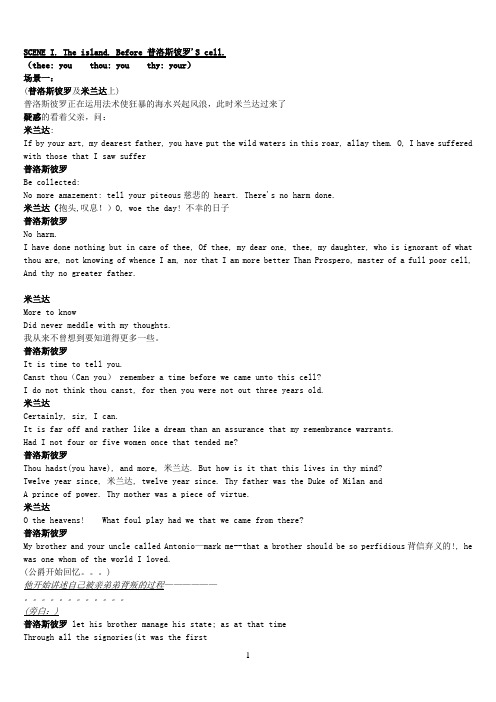
SCENE I. The island. Before 普洛斯彼罗'S cell.(thee: you thou: you thy: your)场景一:(普洛斯彼罗及米兰达上)普洛斯彼罗正在运用法术使狂暴的海水兴起风浪,此时米兰达过来了疑惑的看着父亲,问:米兰达:If by your art, my dearest father, you have put the wild waters in this roar, allay them. O, I have suffered with those that I saw suffer普洛斯彼罗Be collected:No more amazement: tell your piteous慈悲的 heart. There's no harm done.米兰达(抱头,叹息!)O, woe the day! 不幸的日子普洛斯彼罗No harm.I have done nothing but in care of thee, Of thee, my dear one, thee, my daughter, who is ignorant of what thou are, not knowing of whence I am, nor that I am more better Than Prospero, master of a full poor cell, And thy no greater father.米兰达More to knowDid never meddle with my thoughts.我从来不曾想到要知道得更多一些。
普洛斯彼罗It is time to tell you.Canst thou(Can you) remember a time before we came unto this cell?I do not think thou canst, for then you were not out three years old.米兰达Certainly, sir, I can.It is far off and rather like a dream than an assurance that my remembrance warrants.Had I not four or five women once that tended me?普洛斯彼罗Thou hadst(you have), and more, 米兰达. But how is it that this lives in thy mind?Twelve year since, 米兰达, twelve year since. Thy father was the Duke of Milan andA prince of power. Thy mother was a piece of virtue.米兰达O the heavens! What foul play had we that we came from there?普洛斯彼罗My brother and your uncle called Antonio—mark me--that a brother should be so perfidious背信弃义的!, he was one whom of the world I loved.(公爵开始回忆。
莎士比亚话剧原文五人
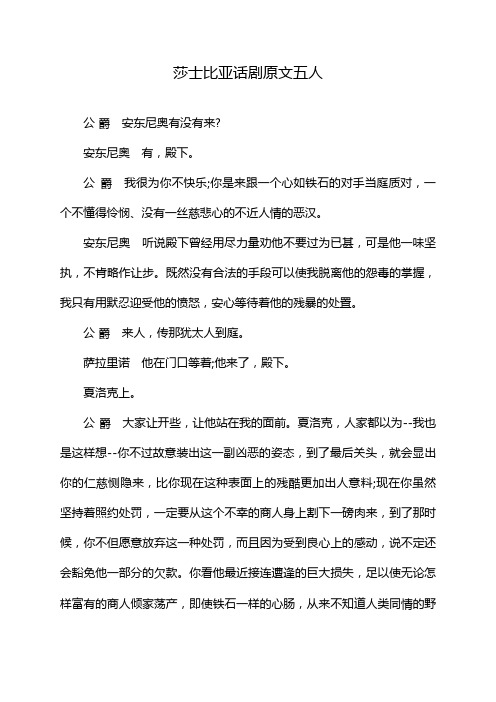
莎士比亚话剧原文五人公爵安东尼奥有没有来?安东尼奥有,殿下。
公爵我很为你不快乐;你是来跟一个心如铁石的对手当庭质对,一个不懂得怜悯、没有一丝慈悲心的不近人情的恶汉。
安东尼奥听说殿下曾经用尽力量劝他不要过为已甚,可是他一味坚执,不肯略作让步。
既然没有合法的手段可以使我脱离他的怨毒的掌握,我只有用默忍迎受他的愤怒,安心等待着他的残暴的处置。
公爵来人,传那犹太人到庭。
萨拉里诺他在门口等着;他来了,殿下。
夏洛克上。
公爵大家让开些,让他站在我的面前。
夏洛克,人家都以为--我也是这样想--你不过故意装出这一副凶恶的姿态,到了最后关头,就会显出你的仁慈恻隐来,比你现在这种表面上的残酷更加出人意料;现在你虽然坚持着照约处罚,一定要从这个不幸的商人身上割下一磅肉来,到了那时候,你不但愿意放弃这一种处罚,而且因为受到良心上的感动,说不定还会豁免他一部分的欠款。
你看他最近接连遭逢的巨大损失,足以使无论怎样富有的商人倾家荡产,即使铁石一样的心肠,从来不知道人类同情的野蛮人,也不能不对他的境遇发生怜悯。
犹太人,我们都在等候你一句温和的回答。
夏洛克我的意思已经向殿下告禀过了;我也已经指着我们的圣安息日起誓,一定要照约执行处罚;要是殿下不准许我的请求,那就是蔑视宪章,我要到京城里去上告,要求撤销贵邦的特权。
您要是问我为什么不愿接受三千块钱,宁愿拿一块腐烂的臭肉,那我可没有什么理由可以回答您,我只能说我欢喜这样,这是不是一个回答?要是我的屋子里有了耗子,我高兴出一万块钱叫人把它们赶掉,谁管得了我?这不是回答了您吗?有的人不爱看张开嘴的猪,有的人瞧见一头猫就要发脾气,还有人听见人家吹风笛的声音,就忍不住要小便;因为一个人的感情完全受着喜恶的支配,谁也做不了自己的主。
现在我就这样回答您:为什么有人受不住一头张开嘴的猪,有人受不住一头有益无害的猫,还有人受不住咿咿唔唔的风笛的声音,这些都是毫无充分的理由的,只是因为天生的癖性,使他们一受到刺激,就会情不自禁地现出丑相来;所以我不能举什么理由,也不愿举什么理由,除了因为我对于安东尼奥抱着久积的仇恨和深刻的反感,所以才会向他进行这一场对于我自己并没有好处的诉讼。
莎士比亚戏剧经典桥段

莎士比亚戏剧经典桥段全文共四篇示例,供读者参考第一篇示例:莎士比亚是英国文学史上最伟大的剧作家之一,他的戏剧作品被誉为世界文学史上的经典之作。
莎士比亚的作品具有深刻的人物性格刻画,丰富多彩的情节设置以及独特的语言风格,至今仍然被广泛地演出和研究。
在他的戏剧作品中,有许多经典的桥段在读者和观众中广为传诵,下面我们就来盘点一些莎士比亚戏剧中的经典桥段。
1.《罗密欧与朱丽叶》中的巧遇《罗密欧与朱丽叶》是莎士比亚最著名的爱情悲剧之一,其中一场经典的桥段就是罗密欧和朱丽叶的第一次巧遇。
在一场宴会上,罗密欧和朱丽叶第一次相遇,在他们的眼中只有对方,两人瞬间陷入了深深的爱情之中。
他们之间的对话和对视成为了整个剧情的转折点,也是爱情故事的开端。
2.《哈姆雷特》中的“生存还是毁灭”《哈姆雷特》是莎士比亚最具有深度和思想性的戏剧之一,其中一个著名的桥段就是主人公哈姆雷特在悲剧的抉择中所面对的“生存还是毁灭”的问题。
在戏剧的高潮部分,哈姆雷特陷入了对自我和人生的深刻反思中,他在内心挣扎着是否应该继续生存下去,还是选择毁灭自己来终结一切痛苦。
这一桥段体现了莎士比亚对于人性的深刻洞察和对于生死问题的思考。
3.《奥赛罗》中的嫉妒与背叛《奥赛罗》是莎士比亚的悲剧作品,其中描写了一个由嫉妒与背叛引发的悲剧故事。
该剧中的经典桥段之一就是主人公奥赛罗对妻子的怀疑和背叛。
奥赛罗因受到手下约哑谋害的谎言而怀疑自己的妻子出轨,最终导致了他们之间的矛盾与悲剧结局。
这一桥段反映了嫉妒与背叛所带来的破坏力和对于信任的珍视。
4.《李尔王》中的忏悔与救赎《李尔王》是莎士比亚的悲剧作品,故事讲述了一个老国王因为贪婪和愚昧而导致家族的破碎和灾难,最终在忏悔与救赎中寻找到了心灵的净化。
在戏剧结尾的经典桥段中,李尔王在孤独和苦难中明白了自己的过错与责任,最终通过自我救赎来化解了灾祸,为观众带来了深刻的感悟和启示。
5.《麦克白》中的野心与复仇《麦克白》是莎士比亚的悲剧作品之一,故事讲述了一个充满野心和复仇欲望的贵族通过谋杀和背叛来达成自己的目的,最终自食其果。
仲夏夜之梦英文话剧剧本精华版

A Midsummer Night's Dream——《仲夏夜之梦》Author: William ShakespearACT 1 (In the city)第一幕 (城中)[道具:两把椅子,一个镜子,一个梳子](音乐起……)旁白:There was a law in the city of Athens which gave to its citizens the power of forcing their daughters to marry whomever they pleased. For if a daughter refused to marry the man her father had chosen to be her h usband, the father has rights to put her to death.在雅典有一条法律赋予市民权力,可以强迫他们的女儿嫁给他们所喜欢的人,因此如果女儿拒绝父亲为她选的丈夫,依据这条法律,父亲可以自行判她死刑。
(Hermia正在梳头,突然她的父亲Egeus走了过来)Egeus: Hermia, you have to marry Demetrious, the best guy in the city.伊吉斯:荷米亚,你必须嫁给狄米崔斯,这城中最好的年轻人。
Hermia: But I don’t love him. I’ve fallen in love with Lysander.赫米娅:但是我不爱他。
我已经爱上了莱赛德。
Egeus: Lysander? Is he better than Demetrious? No!伊吉斯:莱赛德?他会比狄米崔斯好吗?不!Hermia: Oh! Dad! Demetrious had ever said that he love my friend, Helena, and she, a sweet lady also love him deeply.赫米娅:喔!爸爸,狄米崔斯曾说过,他爱我的朋友——海伦娜,而这一个甜美女孩也深爱狄米催斯。
奥赛罗之死(选自[英]莎士比亚话剧《奥赛罗》)
![奥赛罗之死(选自[英]莎士比亚话剧《奥赛罗》)](https://img.taocdn.com/s3/m/f9dedfc77d1cfad6195f312b3169a4517723e539.png)
奥赛罗之死(选自[英]莎士比亚话剧《奥赛罗》)奥赛罗之死(选自[英]莎士比亚话剧《奥赛罗》)舞台气氛图剧照人物苔丝德蒙娜爱米利霞奥赛罗伊雅各蒙坦诺葛莱西安诺[卧室。
[苔丝德蒙娜在屋内,爱米莉霞由里屋上。
爱怎么?他现在的脸色温和得多啦。
苔他说他就会回来的;他叫我去睡,还叫我把你遣开。
爱把我遣开!苔这是他的吩咐;所以,好爱米莉霞,把我的睡衣给我,你去吧,我们现在不能再惹他生气了。
爱我希望您当初并不和他相识!苔我却不希望这样;我是那么喜欢他,即使他的固执、他的呵斥、他的怒容,——请你替我取下衣上的扣针,——在我看来也是可爱的。
我要你准备我的新婚那夜用的床单呢?爱我都准备好了。
夫人,你的针线活儿这样的精妙!这床单绣得真美!苔那还是我母亲在世时教给我的。
爱你看,这床单上面还泛着新婚的光辉呢!苔很好。
天哪!我们的思想是多么傻!要是我比你先死,请你就把那些被褥做我的殓衾。
爱得啦得啦,您在说呆话。
苔我的母亲有一个侍女名叫葩葩拉,她跟人家有了恋爱;她的爱人发了疯,把她丢了。
她有一支《杨柳歌》,那是一支古老的曲调,可是正好说中了她的命运;她到死的时候,嘴里还在唱着它。
那支歌今天晚上老是萦回在我的脑际;我的烦乱的心绪,使我禁不住侧下我的头,学着可怜的葩葩拉的样子唱着它。
苔[唱]可怜的她坐在枫树下啜泣,歌唱那青青杨柳;她手抚着胸膛,她低头靠膝,唱杨柳,杨柳,杨柳。
清澈的流水吐出她的呻吟,唱杨柳,杨柳,杨柳;她的热泪溶化了顽石的心,——把这些放在一旁。
——[唱]唱杨柳,杨柳,杨柳。
快一点,他就要来了。
——[唱]青青的柳枝编成一个翠环;不要怪他,我甘心受他笑骂,——不,下面一句不是这样的。
听!谁在打门?爱是风。
苔你去吧,晚安!爱晚安。
[爱米莉霞下,苔丝德蒙娜睡下。
[奥赛罗上场。
奥只是为了这一个原因,只是为了这一个原因,我的灵魂!纯洁的星星啊,让我不要向你们说出它的名字!只是为了这一个原因……可是我不愿溅她的血,也不愿毁伤她那比白雪更皎洁、比石膏更腻滑的肌肤。
中英:莎士比亚-暴风雨节选
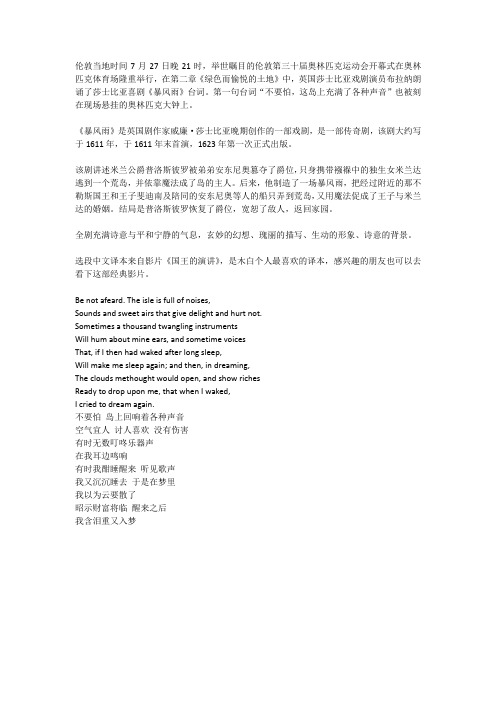
伦敦当地时间7月27日晚21时,举世瞩目的伦敦第三十届奥林匹克运动会开幕式在奥林匹克体育场隆重举行,在第二章《绿色而愉悦的土地》中,英国莎士比亚戏剧演员布拉纳朗诵了莎士比亚喜剧《暴风雨》台词。
第一句台词“不要怕,这岛上充满了各种声音”也被刻在现场悬挂的奥林匹克大钟上。
《暴风雨》是英国剧作家威廉·莎士比亚晚期创作的一部戏剧,是一部传奇剧,该剧大约写于1611年,于1611年末首演,1623年第一次正式出版。
该剧讲述米兰公爵普洛斯彼罗被弟弟安东尼奥篡夺了爵位,只身携带襁褓中的独生女米兰达逃到一个荒岛,并依靠魔法成了岛的主人。
后来,他制造了一场暴风雨,把经过附近的那不勒斯国王和王子斐迪南及陪同的安东尼奥等人的船只弄到荒岛,又用魔法促成了王子与米兰达的婚姻。
结局是普洛斯彼罗恢复了爵位,宽恕了敌人,返回家园。
全剧充满诗意与平和宁静的气息,玄妙的幻想、瑰丽的描写、生动的形象、诗意的背景。
选段中文译本来自影片《国王的演讲》,是木白个人最喜欢的译本,感兴趣的朋友也可以去看下这部经典影片。
Be not afeard. The isle is full of noises,Sounds and sweet airs that give delight and hurt not.Sometimes a thousand twangling instrumentsWill hum about mine ears, and sometime voicesThat, if I then had waked after long sleep,Will make me sleep again; and then, in dreaming,The clouds methought would open, and show richesReady to drop upon me, that when I waked,I cried to dream again.不要怕岛上回响着各种声音空气宜人讨人喜欢没有伤害有时无数叮咚乐器声在我耳边鸣响有时我酣睡醒来听见歌声我又沉沉睡去于是在梦里我以为云要散了昭示财富将临醒来之后我含泪重又入梦。
英美文学:莎士比亚十大经典剧作介绍
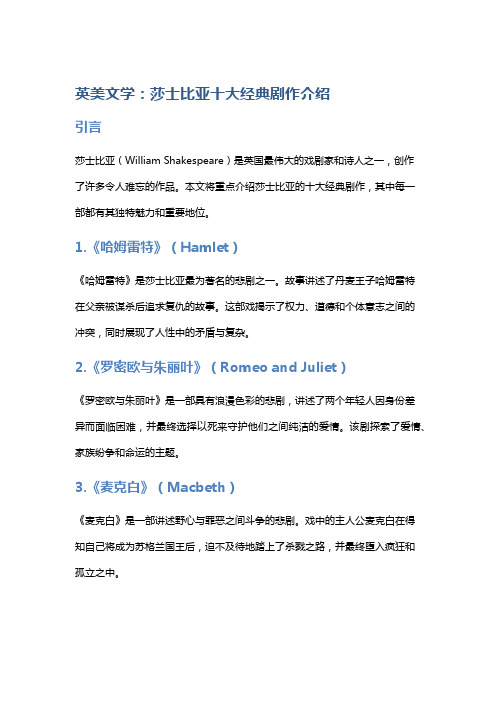
英美文学:莎士比亚十大经典剧作介绍引言莎士比亚(William Shakespeare)是英国最伟大的戏剧家和诗人之一,创作了许多令人难忘的作品。
本文将重点介绍莎士比亚的十大经典剧作,其中每一部都有其独特魅力和重要地位。
1.《哈姆雷特》(Hamlet)《哈姆雷特》是莎士比亚最为著名的悲剧之一。
故事讲述了丹麦王子哈姆雷特在父亲被谋杀后追求复仇的故事。
这部戏揭示了权力、道德和个体意志之间的冲突,同时展现了人性中的矛盾与复杂。
2.《罗密欧与朱丽叶》(Romeo and Juliet)《罗密欧与朱丽叶》是一部具有浪漫色彩的悲剧,讲述了两个年轻人因身份差异而面临困难,并最终选择以死来守护他们之间纯洁的爱情。
该剧探索了爱情、家族纷争和命运的主题。
3.《麦克白》(Macbeth)《麦克白》是一部讲述野心与罪恶之间斗争的悲剧。
戏中的主人公麦克白在得知自己将成为苏格兰国王后,迫不及待地踏上了杀戮之路,并最终堕入疯狂和孤立之中。
4.《奥赛罗》(Othello)《奥赛罗》是莎士比亚的悲剧之一,讲述了关于嫉妒、欺骗和种族偏见的故事。
奥赛罗是一个黑人将军,在婚姻和友谊受到背叛的情况下,陷入了疑心重重的困境。
5.《哈利勒二世》(Henry IV)《哈利勒二世》是一部历史剧,刻画了一个国家内部权力斗争和王位继承问题。
该剧展现了英国历史上的纷争和扭曲政治关系。
6.《凯撒大帝》(Julius Caesar)《凯撒大帝》是一部政治悲剧,描绘了凯撒大帝的非凡征途和他与议会之间的危机。
这部戏揭示了权力、忠诚和背叛之间的复杂关系。
7.《威尼斯商人》(The Merchant of Venice)《威尼斯商人》是一部喜剧,将金钱、友谊和爱情纠缠在一起。
戏中的主题包括信任、欺骗以及对外貌和表面现象的审视。
8.《仲夏夜之梦》(A Midsummer Night's Dream)《仲夏夜之梦》是一部浪漫喜剧,讲述了四组人物在一个神秘森林中相互交错与爱情迷失的故事。
英语戏剧经典剧目
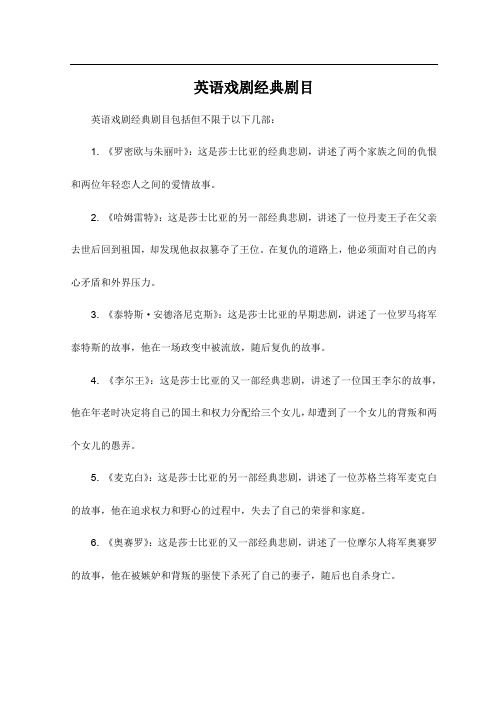
英语戏剧经典剧目
英语戏剧经典剧目包括但不限于以下几部:
1. 《罗密欧与朱丽叶》:这是莎士比亚的经典悲剧,讲述了两个家族之间的仇恨和两位年轻恋人之间的爱情故事。
2. 《哈姆雷特》:这是莎士比亚的另一部经典悲剧,讲述了一位丹麦王子在父亲去世后回到祖国,却发现他叔叔篡夺了王位。
在复仇的道路上,他必须面对自己的内心矛盾和外界压力。
3. 《泰特斯·安德洛尼克斯》:这是莎士比亚的早期悲剧,讲述了一位罗马将军泰特斯的故事,他在一场政变中被流放,随后复仇的故事。
4. 《李尔王》:这是莎士比亚的又一部经典悲剧,讲述了一位国王李尔的故事,他在年老时决定将自己的国土和权力分配给三个女儿,却遭到了一个女儿的背叛和两个女儿的愚弄。
5. 《麦克白》:这是莎士比亚的另一部经典悲剧,讲述了一位苏格兰将军麦克白的故事,他在追求权力和野心的过程中,失去了自己的荣誉和家庭。
6. 《奥赛罗》:这是莎士比亚的又一部经典悲剧,讲述了一位摩尔人将军奥赛罗的故事,他在被嫉妒和背叛的驱使下杀死了自己的妻子,随后也自杀身亡。
此外,还有许多其他的英语戏剧经典剧目,例如《狮子王》、《歌剧魅影》、《悲惨世界》等。
这些剧目都是英语戏剧中的经典之作,具有很高的艺术价值和观赏价值。
莎士比亚哈姆雷特经典片段中英文

《哈姆雷特》是莎士比亚最著名的戏剧之一,被誉为世界文学史上最伟大的文学作品之一。
其中有许多经典片段,被人们传诵和引用,成为了文学经典中的经典。
以下将介绍一些莎士比亚《哈姆雷特》中的经典片段,并对其进行中英对照解读。
一、 "To be, or not to be, that is the question"中文译文:生存还是毁灭,这是个问题这是《哈姆雷特》中最著名的一句台词,也是莎士比亚最为深刻的哲理思考之一。
在这一段中,哈姆雷特对人生的本质进行了思考,他在思考生存和毁灭之间的选择,展现了对人生的矛盾和对逝去的恐惧。
这句台词也成为了莎士比亚的代表作之一,被广泛引用和赞誉。
二、 "What a piece of work is a man!"中文译文:人多么伟大!在这一段中,哈姆雷特对人类的伟大和美好进行了赞美。
他称赞人类是宇宙中最伟大的造物,具有理性和情感,具有神的形象和样子。
这一段台词不仅展现了莎士比亚对人类的赞美,也表现了他对人性的深刻理解。
三、 "The lady doth protest too much, methinks."中文译文:女士实在太过激动了,我想这是《哈姆雷特》中一段充满讽刺的台词。
王后在剧中表演一出戏剧,她的表演过于夸张,哈姆雷特便用这句话来讽刺她。
这句台词形象生动地展现了莎士比亚对人物性格的深刻剖析和对社会现象的嘲讽。
四、 "There are more things in heaven and earth, Horatio, than are dreamt of in your philosophy."中文译文:天地间有许多事情,霍雷肖,远远超出你的哲学所能想象的这是哈姆雷特对霍雷肖说的一句台词,表达了他对世界的奥秘和未知事物的思考。
他认为人类的哲学和学识是有限的,不能涵盖宇宙间的一切奥秘和未知。
[中英对照]莎士比亚戏剧精选四段
![[中英对照]莎士比亚戏剧精选四段](https://img.taocdn.com/s3/m/1cf55146f11dc281e53a580216fc700abb685212.png)
[中英对照]莎士比亚戏剧精选四段Four Passages From the Dramatic Writings of Shakespeare莎士比亚戏剧精选四段【作者简介】威廉莎士比亚,英国历史上,乃至世界历史上最伟大的戏剧大师,他于1564年出生于英国中部的斯特拉夫镇.十三四岁时因家庭破产而辍学。
之后,他先后当过士兵、教师、剧院的杂役、演员和剧团股东。
传说他出生的日期为四月二十三日。
莎士比亚的语言异常凝美,内涵也无比丰富。
Twelfth NightII.iv.103-117[DUKE OF ILLYRIA]What dost thou know?[VIOLA]Too well what love women to men may owe.In faith, they are as true of heart as we.My father had a daughter loved a manAs it might be perhaps, were I a woman,I should your lordship.[DUKE OF ILLYRIA]And what‘s her history?[VIOLA]A blank, my lord. She never told her love,But let concealment, like a worm i‘th‘bud,Feed on her damask cheek. She pined in thought;And, with a green and yellow melancholy,She sat like Patience on a monument,Smiling at grief. Was not this love indeed?We men may say more, swear more; but indeedOur shows are more than will; for still we proveMuch in our vows but little in our love.男人的爱与女人的爱[伊利里亚公爵]您深知的是什么?[薇奥拉]深知女人可以如何热爱男人。
英美戏剧莎士比亚戏剧节选
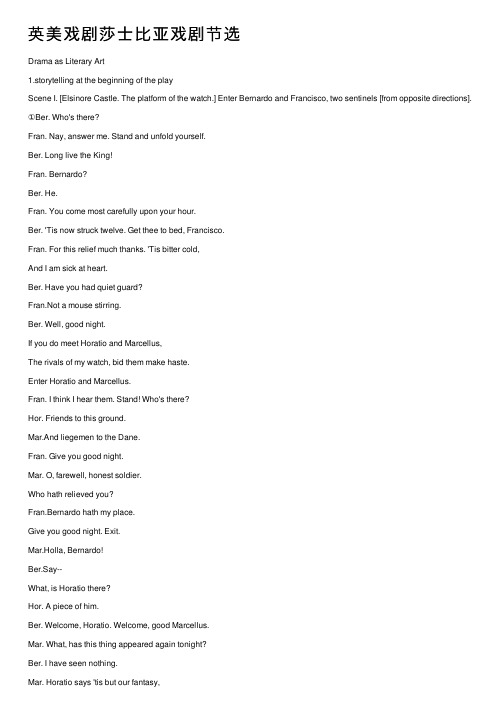
英美戏剧莎⼠⽐亚戏剧节选Drama as Literary Art1.storytelling at the beginning of the playScene I. [Elsinore Castle. The platform of the watch.] Enter Bernardo and Francisco, two sentinels [from opposite directions].①Ber. Who's there?Fran. Nay, answer me. Stand and unfold yourself.Ber. Long live the King!Fran. Bernardo?Ber. He.Fran. You come most carefully upon your hour.Ber. 'Tis now struck twelve. Get thee to bed, Francisco.Fran. For this relief much thanks. 'Tis bitter cold,And I am sick at heart.Ber. Have you had quiet guard?Fran.Not a mouse stirring.Ber. Well, good night.If you do meet Horatio and Marcellus,The rivals of my watch, bid them make haste.Enter Horatio and Marcellus.Fran. I think I hear them. Stand! Who's there?Hor. Friends to this ground.Mar.And liegemen to the Dane.Fran. Give you good night.Mar. O, farewell, honest soldier.Who hath relieved you?Fran.Bernardo hath my place.Give you good night. Exit.Mar.Holla, Bernardo!Ber.Say--What, is Horatio there?Hor. A piece of him.Ber. Welcome, Horatio. Welcome, good Marcellus.Mar. What, has this thing appeared again tonight?Ber. I have seen nothing.Mar. Horatio says 'tis but our fantasy,And will not let belief take hold of himTouching this dreaded sight, twice seen of us.Therefore I have entreated him along,With us to watch the minutes of this night,That, if again this apparition come,He may approve our eyes and speak to it.Hor. Tush, tush, 'twill not appear.Ber.Sit down awhile, And let us once again assail your ears,That are so fortified against our story,What we two nights have seen.Hor.Well, sit we down, And let us hear Bernardo speak of this.Ber. Last night of all,When yond same star that's westward from the pole Had made his course t' illume that part of heaven Where now it burns, Marcellus and myself,The bell then beating one —Enter Ghost. Mar. Peace! break thee off! Look where it comes again! Ber. In the same figure, like the King that's dead. Mar. Thou art a scholar; speak to it, Horatio.Ber. Looks it not like the King? Mark it, Horatio.Hor. Most like. It harrows me with fear and wonder. Ber. It would be spoke to.Mar.Question it, Horatio.…④Mar.'Tis gone and will not answer.Ber. How now, Horatio? You tremble and look pale.Is not this something more than fantasy?What think you on't?Hor. Before my God, I might not this believeWithout the sensible and true avouchOf mine own eyes.Mar.Is it not like the King?Hor. As thou art to thyself.…②Hor.If thou hast any sound, or use of voice,Speak to me.If there be any good thing to be done,That may to thee do ease, and grace to me,Speak to me.…③The cock crows.Speak of it! Stay, and speak!—Stop it, Marcellus! Mar. Shall I strike at it with my partisan ?Hor. Do, if it will not stand.Ber.Tis here!Hor.Tis here!Mar: Tis gone!Exit Ghost.…⑤Ber. It was about to speak, when the cock crew. Hor. And then it started, like a guilty thingUpon a fearful summons. I have heardThe cock, that is the trumpet to the morn,Doth with his lofty and shrill-sounding throat Awake the god of day; and at his warning, Whether in sea or fire, in earth or air,The extravagant and erring spirit hiesTo his confine; and of the truth hereinThis present object made probation.Mar. It faded on the crowing of the cock.Some say that ever 'gainst that season comes Wherein our Saviour's birth is celebrated,The bird of dawning singeth all night long;And then, they say, no spirit dare stir abroad, The nights are wholesome, then no planets strike, No fairy takes, nor witch hath power to charm,So hallowed and so gracious is the time.Hor. So have I heard and do in part believe it. But look, the morn, in russet mantle clad,Walks o'er the dew of yon high eastern hill. Break we our watch up; and by my adviceLet us impart what we have seen tonightUnto young Hamlet; for, upon my life,This spirit, dumb to us, will speak to him.2.retrospectionScene II. [Elsinore Castle. An audience chamber.]Flourish.Enter Claudius, King of Denmark, Gertrude the Queen, Hamlet, Polonius, Laertes and his sister Ophelia, Lords Attendant.King. Though yet of Hamlet our dear brother's deathThe memory be green, and that it us befittedTo bear our hearts in grief, and our whole kingdomTo be contracted in one brow of woe,Yet so far hath discretion fought with natureThat we with wisest sorrow think on himTogether with remembrance of ourselves.Therefore our sometime sister, now our queen,The imperial jointress to this warlike state,Have we, as 'twere with a defeated joy,With an auspicious, and a dropping eye,With mirth in funeral, and with dirge in marriage,In equal scale weighing delight and dole,Taken to wife; nor have we herein barredYour better wisdoms, which have freely goneWith this affair along. For all, our thanks.Now follows, that you know, young Fortinbras,Holding a weak supposal of our worth,Or thinking by our late dear brother's deathOur state to be disjoint and out of frame,Colleagued with this dream of his advantage,He hath not failed to pester us with messageImporting the surrender of those landsLost by his father, with all bands of law,To our most valiant brother. So much for him.3.reportingSailor. God bless you, sir.Hor. Let him bless thee too.Sailor.He shall, sir, an't please him. There's a letter for you, sir,—it comes from the ambassador that was bound for England —if your name be Horatio, as I am let to know it is.Hor. (Reads the letter.) Horatio, when thou shall have overlooked this, give these fellows some means to the King. They have letters for him. Ere we were two days old at sea, a pirate of very warlike appointment gave us chase. Finding ourselves tooslow of sail, we put on a compelled valor, and in the grapple I boarded them. On the instant they got clear of our ship; so I alone became their prisoner. They have dealt with me like thieves of mercy; but they knew what they did: I am to do a good turn for them. Let the King have the letters I have sent, and repair thou to me with as much speed as thou wouldst fly death, I have words to speak in thine ear will make thee dumb; yet are they much too light for the bore of the matter. These good fellows will bring thee where I am. Rosencrantz and Guildenstern hold their course for England. Of them I have much to tell thee. Farewell. He that thou knowest thine,HAMLET.4.choric commentarythe chorus at the opening of Henry VO for a muse of fire, that would ascendThe brightest heaven of invention,A kingdom for a stage, princes to act,And monarchs to behold the swelling scene!Then should the warlike Harry, like himself,Assume the port of Mars; and at his heels,Leasht-in like hounds, should famine, sword, and fire, Crouch for employment. But pardon, gentles all, That flat unraised spirits that have daredOn this unworthy scaffold to bring forthSo great an object: can this cockpit holdThe vasty fields of France? or may we cramWithin this wooden O the very casquesThat did affright the air at Agincourt?O pardon! Since a crooked figure mayAttest in little place a million;And let us, ciphers to this great accompt,On your imaginary forces work.Suppose within the girdle of these wallsAre now confined two mighty monarchies,Whose high-upreared and abutting frontsThe perilous narrow ocean parts asunder;Piece out our imperfections with your thoughts;Into a thousand parts divide one man,And make imaginary puissance;Think, when we talk of horses, that you see them Printing their proud hoofs i’ th’ receiv ing earth;-For ’tis your thoughts that now must deck our kings, Carry them here and there; jumping o’er times, Turning th’accomplishment of many yearsInto an hour-glass; for the which supply,Admit me Chorus to this history;Who, prologue-like, your humble patience pray, Gently to hear, kindly to judge, our play. Hamlet’s soliloquysTo be, or not to be: that is the question:Whether ’tis nobler in the mind to sufferThe slings and arrows of outrageous fortune,Or to take arms against a sea of troubles,And by opposing end them. To die, to sleep;No More; and by a sleep to say we endThe heart-ache and the thousand natural shocksThat flesh is heir to, ’tis a consummationDevoutly to be wished. To die, to sleep;To sleep! Perchance to dream: ay, ther e’s the rub;For in that sleep of death what dreams may come, When we have shuffled off this mortal coil, Must give us pause: there’s the respectThat makes calamity of so long life;For who would bear the whips and scorns of time,The oppressor’s wrong, the proud man’s contumely,The pangs of despised love, the law’s delay,The insolence of office and the spurnsThat patient merit of the unworthy takes,When he himself might his quietus makeWith a bare bodkin? Who would fardels bear,To grunt and sweat under a weary life,But that the dread of something after death,The undiscover’d country, from whose bournNo traveler returns, puzzles the will,And makes us rather bear those ills we haveThan fly to others that we know not of?Thus conscience does make cowards of us all,And thus the native hue of resolutionIs sicklied o’er with the pale cast of thought,And enterprises of great pith and momentWith this regard their currents turn awry,And lose the name of action.Drama as Performing ArtRomeo and Juliet Romeo If I profane with my unworthiest handThis holy shrine, the gentle sin is this:My lips, two blushing pilgrims ready standTo smooth that rough touch with a tender kiss. Juliet Good pilgrim, you do wrong your hand too much, Which mannerly devotion shows in this;For saints have hands that pilgrims’ hands do touch,And palm to palm is holy palmers' kiss. Romeo Have not saints lips, and holy palmers too?Juliet Ay, pilgrim, lips that they must use in prayer. Romeo Oh, then, dear saint, let lips do what hands do!They pray; grant thou, lest faith turn to despair. Juliet Saints do not move, though grant for prayers’ sake. Romeo Then move not while my prayer’s effect I take.Thus from my lips, by thine my sin is purged.。
课本剧莎士比亚经典片段剧本
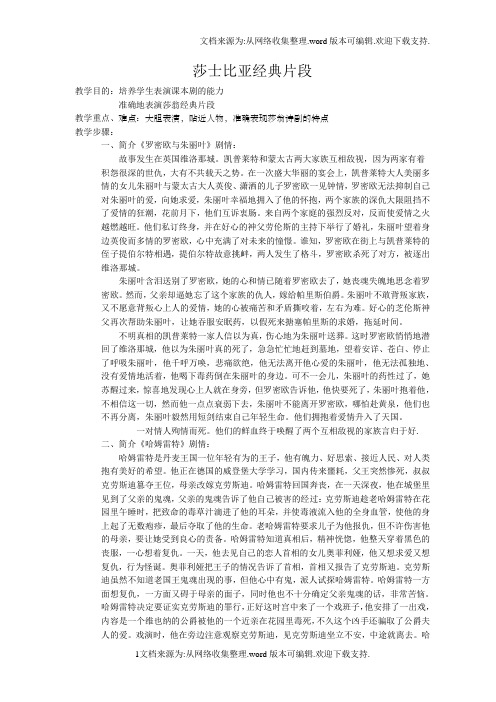
莎士比亚经典片段教学目的:培养学生表演课本剧的能力准确地表演莎翁经典片段教学重点、难点:大胆表演,贴近人物,准确表现莎翁诗剧的特点教学步骤:一、简介《罗密欧与朱丽叶》剧情:故事发生在英国维洛那城。
凯普莱特和蒙太古两大家族互相敌视,因为两家有着积怨很深的世仇,大有不共载天之势。
在一次盛大华丽的宴会上,凯普莱特大人美丽多情的女儿朱丽叶与蒙太古大人英俊、潇洒的儿子罗密欧一见钟情,罗密欧无法抑制自己对朱丽叶的爱,向她求爱,朱丽叶幸福地拥入了他的怀抱,两个家族的深仇大限阻挡不了爱情的狂潮,花前月下,他们互诉衷肠。
来自两个家庭的强烈反对,反而使爱情之火越燃越旺。
他们私订终身,并在好心的神父劳伦斯的主持下举行了婚礼,朱丽叶望着身边英俊而多情的罗密欧,心中充满了对未来的憧憬。
谁知,罗密欧在街上与凯普莱特的侄子提伯尔特相遇,提伯尔特故意挑衅,两人发生了格斗,罗密欧杀死了对方,被逐出维洛那城。
朱丽叶含泪送别了罗密欧,她的心和情已随着罗密欧去了,她丧魂失魄地思念着罗密欧。
然而,父亲却逼她忘了这个家族的仇人,嫁给帕里斯伯爵。
朱丽叶不敢背叛家族,又不愿意背叛心上人的爱情,她的心被痛苦和矛盾撕咬着,左右为难。
好心的芝伦斯神父再次帮助朱丽叶,让她吞服安眠药,以假死来搪塞帕里斯的求婚,拖延时间。
不明真相的凯普莱特一家人信以为真,伤心地为朱丽叶送葬。
这时罗密欧悄悄地潜回了维洛那城,他以为朱丽叶真的死了,急急忙忙地赶到墓地,望着安详、苍白、停止了呼吸朱丽叶,他千呼万唤,悲痛欲绝,他无法离开他心爱的朱丽叶,他无法孤独地、没有爱情地活着,他喝下毒药倒在朱丽叶的身边。
可不一会儿,朱丽叶的药性过了,她苏醒过来,惊喜地发现心上人就在身旁,但罗密欧告诉他,他快要死了,朱丽叶抱着他,不相信这一切,然而他一点点衰弱下去,朱丽叶不能离开罗密欧,哪怕赴黄泉,他们也不再分离,朱丽叶毅然用短剑结束自己年轻生命。
他们拥抱着爱情升入了天国。
一对情人殉情而死。
莎士比亚的十大经典戏剧
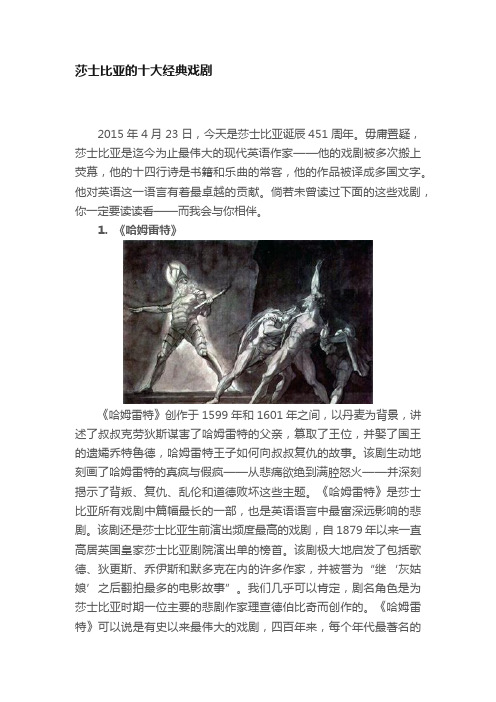
莎士比亚的十大经典戏剧2015年4月23日,今天是莎士比亚诞辰451周年。
毋庸置疑,莎士比亚是迄今为止最伟大的现代英语作家——他的戏剧被多次搬上荧幕,他的十四行诗是书籍和乐曲的常客,他的作品被译成多国文字。
他对英语这一语言有着最卓越的贡献。
倘若未曾读过下面的这些戏剧,你一定要读读看——而我会与你相伴。
1. 《哈姆雷特》《哈姆雷特》创作于1599年和1601年之间,以丹麦为背景,讲述了叔叔克劳狄斯谋害了哈姆雷特的父亲,篡取了王位,并娶了国王的遗孀乔特鲁德,哈姆雷特王子如何向叔叔复仇的故事。
该剧生动地刻画了哈姆雷特的真疯与假疯——从悲痛欲绝到满腔怒火——并深刻揭示了背叛、复仇、乱伦和道德败坏这些主题。
《哈姆雷特》是莎士比亚所有戏剧中篇幅最长的一部,也是英语语言中最富深远影响的悲剧。
该剧还是莎士比亚生前演出频度最高的戏剧,自1879年以来一直高居英国皇家莎士比亚剧院演出单的榜首。
该剧极大地启发了包括歌德、狄更斯、乔伊斯和默多克在内的许多作家,并被誉为“继‘灰姑娘’之后翻拍最多的电影故事”。
我们几乎可以肯定,剧名角色是为莎士比亚时期一位主要的悲剧作家理查德伯比奇而创作的。
《哈姆雷特》可以说是有史以来最伟大的戏剧,四百年来,每个年代最著名的男女演员都出演过该剧。
2.《罗密欧与朱丽叶》《罗密欧和朱丽叶》是莎士比亚早期所著的悲剧(也可能是他写的第一部悲剧),剧中一对命运悲惨的年轻情侣用他们的“英年早逝”换来了两大封建家族的冰释前嫌。
该剧的语言与戏剧效果赢得了文学评论家的高度赞扬。
它是莎士比亚在世期间最受欢迎的戏剧之一,并和《哈姆雷特》一道成为演出频度最高的戏剧之一。
该剧的影响一直延续到今天,人们把剧中的男女主人公当成年轻情侣的典型。
它是有史以来所作的最伟大的爱情故事,并且在每一个时代都被改编成音乐剧、电影和戏剧等。
3.《亨利五世》《亨利五世》创作于1599年,取材于英格兰王亨利五世的生平,以百年战争期间发生在阿金库尔战役前后的事件为中心。
莎士比亚戏剧介绍内容课件PPT

It is the east, and Juliet is the sun. 那是东方,而朱丽叶就是太阳。
——《罗密欧与朱丽叶》
第页
The time is out of joint – O, cursed spite, that ever I was born to set it right!
永恒的经典——
《莎士比亚悲剧喜剧集》
The lunatic, the lover and the poet are of imagination all compact.
疯子、情人、诗人都是想象的产儿。
——《仲夏夜之梦》
Love is merely a madness. 爱情不过是一种疯狂。 ——《皆大欢喜》
——《哈姆雷特》
第页
Love is blind and lovers cannot see the pretty follies that themselves commit.
爱情是盲目的,恋人们看不到自己做的傻事。
The quality of mercy is not strained. 慈悲不是出于勉强。
《威尼斯商人》
它是一部著名喜剧。它是 莎士比亚早期的重要作品, 大约作于1596-1597年。 剧本的主题是歌颂仁爱、 友谊和爱情,同时也反映 了资本主义早期商业资产 阶级与高利贷者之间的矛 盾,表现了作者对资产阶 级社会中金钱、法律和宗 教等问题的人文主义思想。 这部剧作的一个重要文学 成就,就是塑造了夏洛克 这一惟利是图、冷酷无情 的高利贷者的典型形象。
莎 1585—— 1592
士
开始职业生涯
比
亚
1590——1613
最适合单人表演的莎士比亚选段
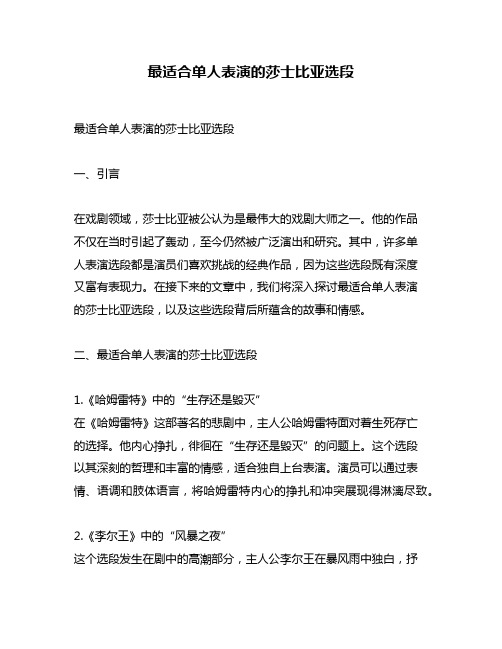
最适合单人表演的莎士比亚选段最适合单人表演的莎士比亚选段一、引言在戏剧领域,莎士比亚被公认为是最伟大的戏剧大师之一。
他的作品不仅在当时引起了轰动,至今仍然被广泛演出和研究。
其中,许多单人表演选段都是演员们喜欢挑战的经典作品,因为这些选段既有深度又富有表现力。
在接下来的文章中,我们将深入探讨最适合单人表演的莎士比亚选段,以及这些选段背后所蕴含的故事和情感。
二、最适合单人表演的莎士比亚选段1.《哈姆雷特》中的“生存还是毁灭”在《哈姆雷特》这部著名的悲剧中,主人公哈姆雷特面对着生死存亡的选择。
他内心挣扎,徘徊在“生存还是毁灭”的问题上。
这个选段以其深刻的哲理和丰富的情感,适合独自上台表演。
演员可以通过表情、语调和肢体语言,将哈姆雷特内心的挣扎和冲突展现得淋漓尽致。
2.《李尔王》中的“风暴之夜”这个选段发生在剧中的高潮部分,主人公李尔王在暴风雨中独白,抒发内心的挣扎和痛苦。
这个选段充满了戏剧性的张力和情感的爆发,是一段非常具有表现力和感染力的单人表演选段。
3.《麦克白》中的“悲剧命运”《麦克白》是莎士比亚最著名的悲剧之一,而其中的“悲剧命运”这一选段更是充满了悲壮和深刻的哲理。
演员可以通过这一选段,将麦克白内心的恐惧、罪恶和绝望表现得淋漓尽致,给观众留下深刻的印象。
4.《奥赛罗》中的“嫉妒的伤害”在《奥赛罗》中,奥赛罗的妻子出轨,他深受背叛的伤害,内心充满了愤怒和绝望。
这个选段充满了情感的爆发和内心的挣扎,适合独自上台表演,展现角色的复杂性和深度。
三、个人观点和理解莎士比亚的作品充满了戏剧性和情感的张力,其选段也是演员们喜欢挑战的经典作品。
在我看来,最适合单人表演的莎士比亚选段都具有深刻的内心挣扎和情感表达,这对演员的表演功底要求极高。
只有演员能够完全融入角色,将角色的内心世界以最真实的方式呈现出来,才能够将这些选段演绎得淋漓尽致。
四、总结以上便是最适合单人表演的莎士比亚选段的一些推荐,这些选段在戏剧性和情感表达方面都具有独特的魅力。
莎士比亚戏剧摘抄笔记中英文
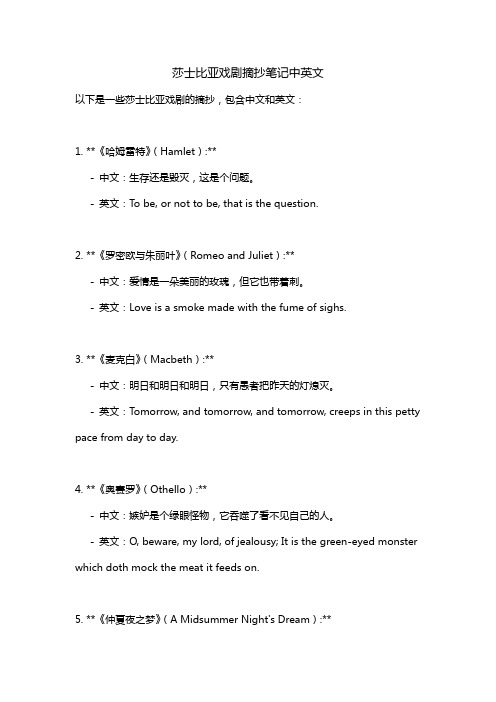
莎士比亚戏剧摘抄笔记中英文以下是一些莎士比亚戏剧的摘抄,包含中文和英文:1. **《哈姆雷特》(Hamlet):**- 中文:生存还是毁灭,这是个问题。
- 英文:To be, or not to be, that is the question.2. **《罗密欧与朱丽叶》(Romeo and Juliet):**- 中文:爱情是一朵美丽的玫瑰,但它也带着刺。
- 英文:Love is a smoke made with the fume of sighs.3. **《麦克白》(Macbeth):**- 中文:明日和明日和明日,只有愚者把昨天的灯熄灭。
- 英文:Tomorrow, and tomorrow, and tomorrow, creeps in this petty pace from day to day.4. **《奥赛罗》(Othello):**- 中文:嫉妒是个绿眼怪物,它吞噬了看不见自己的人。
- 英文:O, beware, my lord, of jealousy; It is the green-eyed monster which doth mock the meat it feeds on.5. **《仲夏夜之梦》(A Midsummer Night's Dream):**- 中文:爱是盲目的,而且最好的心灵抚慰剂就是时间。
- 英文:Love looks not with the eyes, but with the mind, and therefore is winged Cupid painted blind.这些摘抄展示了莎士比亚戏剧中深刻的智慧、对人性的洞察以及对爱、时间、嫉妒等主题的独特表达。
- 1、下载文档前请自行甄别文档内容的完整性,平台不提供额外的编辑、内容补充、找答案等附加服务。
- 2、"仅部分预览"的文档,不可在线预览部分如存在完整性等问题,可反馈申请退款(可完整预览的文档不适用该条件!)。
- 3、如文档侵犯您的权益,请联系客服反馈,我们会尽快为您处理(人工客服工作时间:9:00-18:30)。
Drama as Literary Art1.storytelling at the beginning of the playScene I. [Elsinore Castle. The platform of the watch.] Enter Bernardo and Francisco, two sentinels [from opposite directions].①Ber. Who's there?Fran. Nay, answer me. Stand and unfold yourself.Ber. Long live the King!Fran. Bernardo?Ber. He.Fran. You come most carefully upon your hour.Ber. 'Tis now struck twelve. Get thee to bed, Francisco.Fran. For this relief much thanks. 'Tis bitter cold,And I am sick at heart.Ber. Have you had quiet guard?Fran.Not a mouse stirring.Ber. Well, good night.If you do meet Horatio and Marcellus,The rivals of my watch, bid them make haste.Enter Horatio and Marcellus.Fran. I think I hear them. Stand! Who's there?Hor. Friends to this ground.Mar.And liegemen to the Dane.Fran. Give you good night.Mar. O, farewell, honest soldier.Who hath relieved you?Fran.Bernardo hath my place.Give you good night. Exit.Mar.Holla, Bernardo!Ber.Say--What, is Horatio there?Hor. A piece of him.Ber. Welcome, Horatio. Welcome, good Marcellus.Mar. What, has this thing appeared again tonight?Ber. I have seen nothing.Mar. Horatio says 'tis but our fantasy,And will not let belief take hold of himTouching this dreaded sight, twice seen of us.Therefore I have entreated him along,With us to watch the minutes of this night,That, if again this apparition come,He may approve our eyes and speak to it.Hor. Tush, tush, 'twill not appear.Ber.Sit down awhile, And let us once again assail your ears,That are so fortified against our story,What we two nights have seen.Hor.Well, sit we down, And let us hear Bernardo speak of this.Ber. Last night of all,When yond same star that's westward from the pole Had made his course t' illume that part of heaven Where now it burns, Marcellus and myself,The bell then beating one —Enter Ghost. Mar. Peace! break thee off! Look where it comes again! Ber. In the same figure, like the King that's dead.Mar. Thou art a scholar; speak to it, Horatio.Ber. Looks it not like the King? Mark it, Horatio.Hor. Most like. It harrows me with fear and wonder. Ber. It would be spoke to.Mar.Question it, Horatio.…④Mar.'Tis gone and will not answer.Ber. How now, Horatio? You tremble and look pale.Is not this something more than fantasy?What think you on't?Hor. Before my God, I might not this believeWithout the sensible and true avouchOf mine own eyes.Mar.Is it not like the King?Hor. As thou art to thyself.…②Hor.If thou hast any sound, or use of voice,Speak to me.If there be any good thing to be done,That may to thee do ease, and grace to me,Speak to me.…③The cock crows.Speak of it! Stay, and speak!—Stop it, Marcellus!Mar. Shall I strike at it with my partisan ?Hor. Do, if it will not stand.Ber.Tis here!Hor.Tis here!Mar: Tis gone!Exit Ghost.…⑤Ber. It was about to speak, when the cock crew.Hor. And then it started, like a guilty thingUpon a fearful summons. I have heardThe cock, that is the trumpet to the morn,Doth with his lofty and shrill-sounding throatAwake the god of day; and at his warning,Whether in sea or fire, in earth or air,The extravagant and erring spirit hiesTo his confine; and of the truth hereinThis present object made probation.Mar. It faded on the crowing of the cock.Some say that ever 'gainst that season comesWherein our Saviour's birth is celebrated,The bird of dawning singeth all night long;And then, they say, no spirit dare stir abroad,The nights are wholesome, then no planets strike,No fairy takes, nor witch hath power to charm,So hallowed and so gracious is the time.Hor. So have I heard and do in part believe it.But look, the morn, in russet mantle clad,Walks o'er the dew of yon high eastern hill.Break we our watch up; and by my adviceLet us impart what we have seen tonightUnto young Hamlet; for, upon my life,This spirit, dumb to us, will speak to him.2.retrospectionScene II. [Elsinore Castle. An audience chamber.]Flourish.Enter Claudius, King of Denmark, Gertrude the Queen, Hamlet, Polonius, Laertes and his sister Ophelia, Lords Attendant.King. Though yet of Hamlet our dear brother's deathThe memory be green, and that it us befittedTo bear our hearts in grief, and our whole kingdomTo be contracted in one brow of woe,Yet so far hath discretion fought with natureThat we with wisest sorrow think on himTogether with remembrance of ourselves.Therefore our sometime sister, now our queen,The imperial jointress to this warlike state,Have we, as 'twere with a defeated joy,With an auspicious, and a dropping eye,With mirth in funeral, and with dirge in marriage,In equal scale weighing delight and dole,Taken to wife; nor have we herein barredYour better wisdoms, which have freely goneWith this affair along. For all, our thanks.Now follows, that you know, young Fortinbras,Holding a weak supposal of our worth,Or thinking by our late dear brother's deathOur state to be disjoint and out of frame,Colleagued with this dream of his advantage,He hath not failed to pester us with messageImporting the surrender of those landsLost by his father, with all bands of law,To our most valiant brother. So much for him.3.reportingSailor. God bless you, sir.Hor. Let him bless thee too.Sailor.He shall, sir, an't please him. There's a letter for you, sir,—it comes from the ambassador that was bound for England—if your name be Horatio, as I am let to know it is.Hor. (Reads the letter.) Horatio, when thou shall have overlooked this, give these fellows some means to the King. They have letters for him. Ere we were two days old at sea, a pirate of very warlike appointment gave us chase. Finding ourselves too slow of sail, we put on a compelled valor, and in the grapple I boarded them. On the instant they got clear of our ship; so I alone became their prisoner. They have dealt with me like thieves of mercy; but they knew what they did: I am to do a good turn for them. Let the King have the letters I have sent, and repair thou to me with as much speed as thou wouldst fly death, I have words to speak in thine ear will make thee dumb; yet are they much too light for the bore of the matter. These good fellows will bring thee where I am. Rosencrantz and Guildenstern hold their course for England. Of them I have much to tell thee. Farewell. He that thou knowest thine,HAMLET.4.choric commentarythe chorus at the opening of Henry VO for a muse of fire, that would ascendThe brightest heaven of invention,A kingdom for a stage, princes to act,And monarchs to behold the swelling scene!Then should the warlike Harry, like himself,Assume the port of Mars; and at his heels,Leasht-in like hounds, should famine, sword, and fire, Crouch for employment. But pardon, gentles all, That flat unraised spirits that have daredOn this unworthy scaffold to bring forthSo great an object: can this cockpit holdThe vasty fields of France? or may we cramWithin this wooden O the very casquesThat did affright the air at Agincourt?O pardon! Since a crooked figure mayAttest in little place a million;And let us, ciphers to this great accompt,On your imaginary forces work.Suppose within the girdle of these wallsAre now confined two mighty monarchies,Whose high-upreared and abutting frontsThe perilous narrow ocean parts asunder;Piece out our imperfections with your thoughts;Into a thousand parts divide one man,And make imaginary puissance;Think, when we talk of horses, that you see them Printing their proud hoofs i’ th’ receiv ing earth;-For ’tis your thoughts that now must deck our kings, Carry them here and there; jumping o’er times, Turning th’ accomplishment of many yearsInto an hour-glass; for the which supply,Admit me Chorus to this history;Who, prologue-like, your humble patience pray, Gently to hear, kindly to judge, our play. Hamlet’s soliloquysTo be, or not to be: that is the question:Whether ’tis nobler in the mind to sufferThe slings and arrows of outrageous fortune,Or to take arms against a sea of troubles,And by opposing end them. To die, to sleep;No More; and by a sleep to say we endThe heart-ache and the thousand natural shocksThat flesh is heir to, ’tis a consummationDevoutly to be wished. To die, to sleep;To sleep! Perchance to dream: ay, ther e’s the rub;For in that sleep of death what dreams may come, When we have shuffled off this mortal coil,Must give us pause: there’s the respectThat makes calamity of so long life;For who would bear the whips and scorns of time,The oppressor’s wrong, the proud man’s contumely,The pangs of despised love, the law’s delay,The insolence of office and the spurnsThat patient merit of the unworthy takes,When he himself might his quietus makeWith a bare bodkin? Who would fardels bear,To grunt and sweat under a weary life,But that the dread of something after death,The undiscover’d country, from whose bournNo traveler returns, puzzles the will,And makes us rather bear those ills we haveThan fly to others that we know not of?Thus conscience does make cowards of us all,And thus the native hue of resolutionIs sicklied o’er with the pale cast of thought,And enterprises of great pith and momentWith this regard their currents turn awry,And lose the name of action.Drama as Performing ArtRomeo and Juliet Romeo If I profane with my unworthiest handThis holy shrine, the gentle sin is this:My lips, two blushing pilgrims ready standTo smooth that rough touch with a tender kiss. Juliet Good pilgrim, you do wrong your hand too much, Which mannerly devotion shows in this;For saints have hands that pilgrims’ hands do touch,And palm to palm is holy palmers' kiss. Romeo Have not saints lips, and holy palmers too?Juliet Ay, pilgrim, lips that they must use in prayer. Romeo Oh, then, dear saint, let lips do what hands do!They pray; grant thou, lest faith turn to despair. Juliet Saints do not move, though grant for prayers’ sake. Romeo Then move not while my prayer’s effect I take.Thus from my lips, by thine my sin is purged.。
